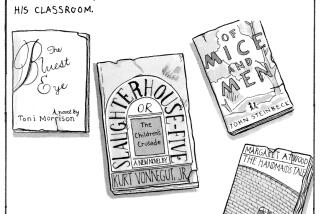Removal of Ban on ‘Zhivago’ Sought : Soviet Writers Critical of Censors, Laud Pasternak
- Share via
MOSCOW — Leading Soviet writers, at an unusually critical official news conference Monday, attacked literary censorship and official silence about mistakes made by Soviet dictator Josef Stalin.
The writers spoke out at a news conference arranged by the Foreign Ministry following the eighth Soviet Writers’ Congress, which took place last week and featured a free-wheeling debate about the limits imposed on creative writing.
The congress unexpectedly approved establishment of a museum to honor the late author and poet Boris Pasternak. And some writers said an official ban on Pasternak’s novel “Dr. Zhivago” should be removed.
Vitaly Korotich, editor of the weekly magazine Ogonyok, said the writers agreed that censorship should be limited to subjects dealing with propaganda, racial hatred, pornography and military secrets.
No Censorship
“Censorship must not interfere in the purely literary process,” he said.
As for “Dr. Zhivago,” he said, “it’s not very revolutionary, and it’s logical to publish it.”
Poet Yevgeny Yevtushenko denounced the literary silence in connection with Stalin’s mistakes.
“We can’t solve our current and future problems unless we say the whole truth about what was done in the past,” he said. “There can be a conservative approach--don’t pour salt on the wounds. I think pouring sugar on the wounds is even worse than pouring salt.”
Sergei Mikhailov, a Moscow writer, urged editors to stand up to the state censorship agency, which is known by its Russian acronym GLAVLIT.
May Have Won Battle
At the news conference, the writers were asked if GLAVLIT’s authority might be reduced or if a new director might be named to run the agency, but they declined to answer. However, the selection of the panelists and their known attitudes toward censorship indicated that the writers may have won a battle for more creative freedom.
Pasternak, who died in 1960, became a symbol of the clash between conservative managers of the writers’ union and the forces seeking change within the organization. Pasternak is known to Soviet readers mainly for his poetry, but Western readers generally associate him with “Dr. Zhivago,” which was published abroad in 1957 but has never been brought out here.
Yevtushenko said the state publishing house “will be studying this question” of reversing the ban on “Dr. Zhivago,” which was imposed under Nikita S. Khrushchev, premier from 1958 to 1964.
Pasternak Museum Sought
Yevtushenko, who once rocked the Kremlin with daring works of his own, said 40 major writers, including several prize winners, appealed to the writers’ congress to create a Pasternak museum at the author’s former dacha , or cottage, in the Moscow suburb of Peredelkino.
In his speech to the congress, Yevtushenko said, he took the extremely unorthodox step of asking for a vote on the proposal, and a majority of the delegates approved it.
In the past, the Pasternak family has proposed conversion of the dacha into such a museum, but the writers have rejected the idea. The union assigns dachas to its most prominent members.
Chingiz Aitmatov, another leading writer, said he was offered the use of the Pasternak dacha but turned it down.
“I would rather keep this house as a museum for this great poet,” he said. “I think the problem of Boris Pasternak is solved.”
Victory Over Bureaucracy
The congress apparently resulted in a victory for writers unhappy with the union bureaucracy. Yevtushenko said several writers who are not members of the union were elected to its ruling bodies anyway, an extraordinary step.
“We had quite acute discussions, quite sharp polemics,” Aitmatov said.
Mikhailov said some delegates complained that the union was behaving like “a literary ministry” and failing to foster creativity. Still, he added, “no one cut the speeches short, and no one knew what was going to be said.”
Mikhail Shatrov, a playwright, said that while the congress was in session, some of the delegates had a four-hour meeting with Soviet leader Mikhail S. Gorbachev.
It was an “absolutely free exchange of views,” Shatrov said, and Gorbachev made no effort to tell them what they should be writing or not writing.
More to Read
Sign up for Essential California
The most important California stories and recommendations in your inbox every morning.
You may occasionally receive promotional content from the Los Angeles Times.












